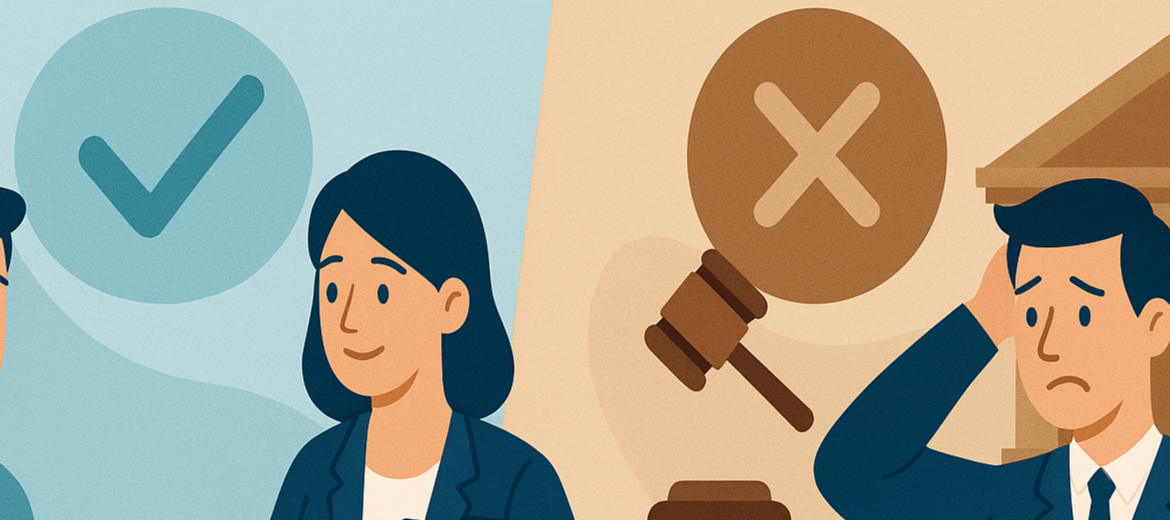Outstanding invoices can seriously hinder the financial health of your business. When clients fail to pay, you as an entrepreneur are faced with an important decision: should you opt for an amicable debt collection procedure or initiate legal action? In this article, we clearly and practically explain the differences, when to start each process, and how CW & Partners can professionally support you.
What is a debt collection procedure?
A debt collection procedure is the process by which a creditor attempts to recover an outstanding payment. This can be done in two ways:
- Amicable debt collection – without court involvement.
- Legal debt collection – through judicial action via the courts.
The choice between these two paths depends on several factors, including the debtor’s attitude, the size of the claim, prior communication, and whether you want to preserve the client relationship.
What is an amicable debt collection procedure?
An amicable procedure refers to the out-of-court phase of debt recovery. A collection agency like CW & Partners attempts to persuade the client to pay without involving legal authorities. This typically involves reminders, demand letters, phone calls, and negotiations.
Advantages of amicable debt collection:
- Faster and cheaper than legal proceedings.
- Preserves client relationships through diplomatic communication.
- No court costs, such as court fees or attorney expenses.
- Flexible, allowing for payment plans or settlements.
When should you choose an amicable procedure?
- For first-time payment delays.
- If the debtor is reachable and shows willingness to pay.
- When you want to save time and avoid legal costs.
At CW & Partners, we always aim to fully explore the amicable route first, as it is often the fastest and most customer-friendly solution.
What is a legal debt collection procedure?
A legal debt collection procedure involves taking formal legal action against the debtor, usually by filing a summons. If the court rules in your favor, you receive a judgment that allows you to enforce payment through measures such as wage garnishment, bank seizure, or property liens.
Advantages of legal debt collection:
- A legally binding judgment provides strong enforcement powers.
- Acts as a deterrent against non-compliant debtors.
- Enables seizure of assets, such as wages or bank accounts.
Disadvantages:
- Costs related to court fees, legal representation, and bailiff services.
- Longer process compared to amicable collection.
- Potential damage to client relationships.
When should you start a legal procedure?
- When the amicable phase has failed.
- For large claims or principled matters.
- If the debtor is uncooperative or unreachable.
At CW & Partners, we evaluate each case individually to determine whether legal action is justified and effective. We provide honest and transparent advice.
How does a debt collection procedure work at CW & Partners?
We follow a clear, structured process:
- Case analysis: We assess whether amicable collection is likely to succeed.
- Amicable phase: We begin with reminders, phone calls, and payment plans.
- Tailored advice: If no payment is made, we discuss legal options with you.
- Legal action: If necessary, we initiate and manage the full legal procedure.
- Enforcement: After judgment, we handle seizures and follow-up steps.
Our strength lies in our combination of diplomacy, legal knowledge, and results-driven approach. This ensures you receive the most effective strategy for each situation.
What does a debt collection procedure cost?
Costs depend on the chosen process and the complexity of the case. At CW & Partners, we offer transparent pricing, including the possibility of no-cure-no-pay in the amicable phase. For legal actions, we provide a clear cost estimate in advance so you always know what to expect.
Practical tips for choosing a collection path
- Always begin with amicable collection, unless the debtor is clearly unwilling.
- Document everything – invoices, communication, and payment agreements.
- Request a legal analysis for complex or high-value claims.
- Choose a collection agency with legal expertise, such as CW & Partners.
- Weigh time, costs, and relationship value in your decision-making.
Why choose CW & Partners?
- Registered in the WKI registry and authorized to collect on behalf of third parties.
- Experts in both amicable and legal debt collection.
- Focused on maintaining client relationships wherever possible.
- Personalized advice and a dedicated contact person.
- Transparent communication and clear reporting.
Conclusion
Choosing between an amicable or legal debt collection procedure depends on multiple factors: the debtor’s attitude, the size of the claim, your business priorities, and the urgency of payment. In most cases, it’s advisable to begin with an amicable procedure. If payment still doesn’t follow, the legal route remains a powerful option.
Would you like to know which collection route suits your situation best? Contact CW & Partners for a no-obligation consultation. We’ll help you recover your outstanding claims quickly, professionally, and effectively.

